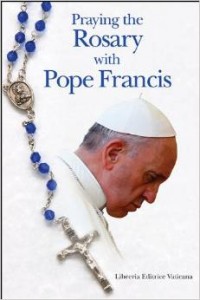 Pope Francis condemned Friday’s acts of terrorism in Francis as an “affront to human dignity,” encouraging attendees to find hope in Jesus.
Pope Francis condemned Friday’s acts of terrorism in Francis as an “affront to human dignity,” encouraging attendees to find hope in Jesus.
“I wish to express my deep sorrow for the terrorist attacks, which, on Friday evening, covered France in blood,” the Pope said in his Nov. 15 Angelus address.
“Such barbarity leaves us shocked and makes us wonder how the human heart can conceive and carry out such horrible events, which have shaken not only France, but the entire world.”
Speaking to pilgrims gathered in St. Peter’s Square, the Pope said that when faced with such “intolerable” acts of violence, one “cannot but condemn the disgraceful affront to human dignity.”
Francis assured his closeness to French President Francois Hollande, as well as to the families of the dead and wounded, entrusting them to the mercy of God.
“I wish to forcefully reaffirm that the path of violence and hate can never solve the problems of humanity!” he said, adding, “To use the name of God to justify this path is blasphemy.”
He prayed that Mary would protect and watch over France, Europe and the entire world, and he paused for a moment of silence, before leading pilgrims in praying a Hail Mary.
The Pope’s comments come in the wake of the worst terrorist attack Europe has seen since the Madrid train bombings of 2004, when Islamic extremists killed 191 people.
On Nov. 13, eight Islamic terrorists carried out a violent siege across Paris, targeting bars, restaurants, a concert hall and a football stadium in the heart of the city.
It was the deadliest attack on French soil since World War II, killing at least 129 people and leaving 352 injured, 99 of whom remain in critical condition, Reuters news reported.
Eyewitnesses reported hearing the terrorists cry out Allahu Akbar! — Arabic for “God is Great!” as the violence unraveled.
In his reflections on the day’s Gospel, Pope Francis focused on Jesus’ description of the end times in the day’s Gospel, taken from Mark, Chapter 13.
Among the apocalyptic signs Jesus mentions are wars, famines and cosmic catastrophes, such as the darkening of the sun and the moon. However, the Pope emphasized that these elements “are not the essential part of the message.”
The heart of Jesus’ message, Francis said, “is himself; the mystery of his person, and of his death and resurrection, and his return at the end of time.”
Our ultimate goal is to encounter the risen Lord, he said, explaining that “we aren’t waiting for a time or a place, but we’re going toward a Person: Jesus.”
Because of this, our main concern shouldn’t be how or when the signs will occur, but to be ready and focused on how we should live and act today, he said.
He turned to the parable Jesus tells his disciples of the fig tree that sprouts and grows leaves when the summer is near. What the image shows us, he said, is that “the prospect of the end doesn’t distract us from present life, but makes us look to our days with a perspective of hope.”
“That virtue is so hard to live: hope. It’s the smallest of the virtues, but it’s the strongest,” he said, adding that our hope is found in “the face of the risen Lord.”
Jesus’ victory at the end times will be the triumph of his cross, Francis said. It is the proof that self-sacrifice done out of love for another is “the only victorious power” and the only stable point in the midst of the tragedies and turmoil of the world.
In addition to being the final destination of our earthly pilgrimage, Jesus is also a constant presence in our lives, he said, explaining that Jesus references the future as a means of inspiring his disciples to live the present better.
“(Jesus) stands against false prophets, against the visionaries who perceive that the end of the world is near and against fatalism,” the Pope said, explaining that, in every age, the Lord seeks to rescue his disciples from “curiosity, dates, projections, horoscopes” and to help them focus on the present.
In off-the-cuff remarks, Pope Francis asked how many of those gathered read daily horoscopes. He told them not to answer aloud, but to respond “internally.”
For those who read such things, Francis told them to turn to Jesus, “who is with you,” adding, “It’s better. It will be better for you.”
The Pope closed by stressing the importance of being vigilant and warned against the extremes of either impatience or “drowsiness,” as well as the temptation to either look too far into the future or remain too attached to the present, without thinking about our final destination.
“Even to this day, there is no shortage of natural and moral disasters, nor of adversity and hardships of every kind,” he said, and he reminded attendees that the Lord is the “only guiding Light that refreshes our steps.”